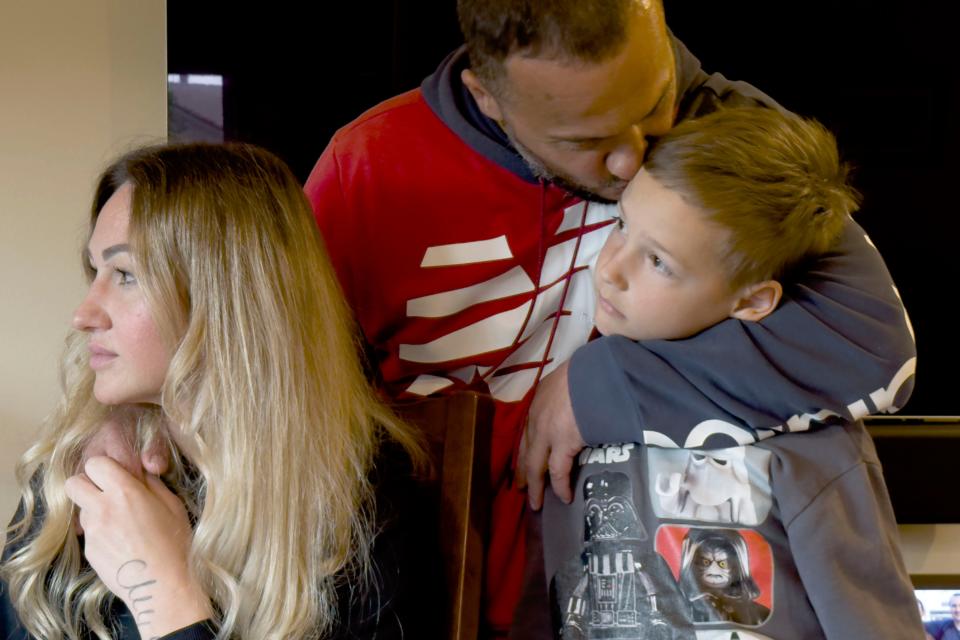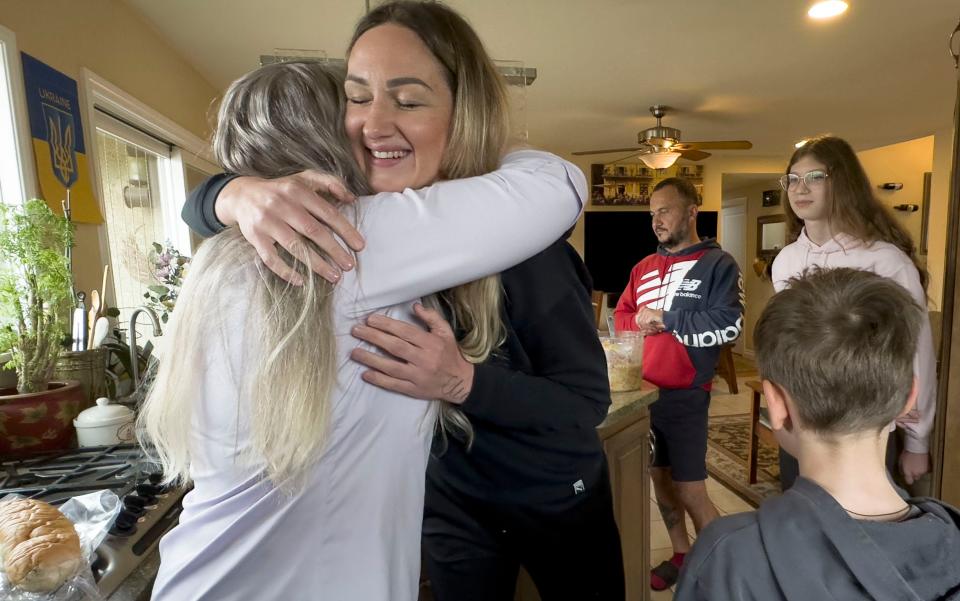Stacked deck: Ukrainian family of 5 struggles for refuge in the Conejo Valley
They need a home to rent. And a co-signer. And jobs. And a way to communicate.
Yuliia Kurta, who fled the war in Ukraine with her husband and their three children, walked through Cherie Phoenix’s crowded home in Thousand Oaks, speaking into a cellphone positioned inches from her face. An app turned the Ukrainian words into English, in an automated voice that could have been Siri’s.
Kurta, who speaks almost no English, carries the phone everywhere so she can talk with nonprofits that help refugees, potential landlords, school officials who are enrolling her children, and Phoenix and her husband, John Longawa, who took in the family of five more than a month ago.
The app is a lifeline — with a catch.
“It’s often wrong,” Phoenix said. Sometimes words are left out. Sometimes when the app doesn't recognize words, it makes up new ones including, in one memorable conversation, “porno.”
The miscues mark a journey filled with barriers, potholes and, in between them, hope as the Kurtas seek a simple goal, best stated by Andrii and Yuliia’s parents who insisted their children leave the country and the war behind them.
“They want their grandkids to live in a safe place,” Andrii explained with the help of an interpreter from Agoura Hills.

'Safe but not at peace'
The Kurtas gathered near the kitchen in Phoenix’s home, their temporary residence for seven weeks and counting. Seva, 8, lounged on a sofa in a "Star Wars" T-shirt though he's really a Spiderman fan. The two girls, 14-year-old Marharyta and 5-year-old Adriana, wore Minnie Mouse garb.
Yuliia and Andrii stood in a doorway holding hands. They’ve been married 11 years in a relationship summed up by the English tattoo on Yuliia’s arm. “My angel is always with me,” it says.
They lived in a four-bedroom home in Zaporizhzhia, a city of 700,000 people in southeastern Ukraine. Yuliia worked as a hairdresser. Andrii was a car mechanic who owned his own repair business and also worked as a construction contractor.
The Russian invasion on Feb. 24, 2022, unleashed chaos and fear. Zaporizhzhia, home of Europe’s largest nuclear power plant, was a target then and now. Missiles struck a nine-story apartment building in the city on Wednesday in one of many attacks the Kurtas follow on their phones. They call their parents every day, sometimes just to make sure they are OK.
"We feel safe but not at peace," Yuliia said, noting that emotion will come only when the war has ended.
At the beginning of the fighting, alarms sounded so often the Kurta children would fall to the floor covering their heads with their hands.

The family fled out of fear for the children's safety, driving for four days as missiles screamed overhead, sometimes passing corpses on the road. They crossed the border into Hungary and ultimately ended up in Nice, France, where they lived for several months.
With the help of a refugee nonprofit organization, they flew to North Carolina. They relocated to Los Angeles because they thought there would be more jobs and opportunities. They were given enough money for a motel in the heart of the city for four days in a stay that brought encounters with transients and a bullet that 5-year-old Adriana found in the street.
“We were very scared,” Yuliia said.
Finding refuge in Thousand Oaks
Phoenix for years ran a nonprofit that provided counseling, case management and other services for people with brain injuries. Longawa, her husband, is a computer programmer who works from home.
They signed up to serve as refugee hosts nearly two years ago after United States pulled troops out of Afghanistan. Early in February, they received an emergency email from Nova Ukraine, a nonprofit group that helps refugees.
“Are you still accepting families?” it read. The next day, the Kurtas arrived at their doorstep with 10 suitcases.
Marharyta, who speaks a little English, sleeps on a sofa. Seva and Adriana occupy one of the spare bedrooms with their parents in the other. The American and Ukrainian families use the translation app to talk, shuttling phones back and forth depending on which battery is charged.
The two families go their own way during the day, coming together for dinner every night.
“We are settling in more like a regular family,” Phoenix said, noting the relationship has progressed beyond the initial, sometimes awkward niceties. “We’ve gotten to the point of being comfortable with each other.”
Not enough money for rent
Phoenix was told nearly two months ago the arrangement would likely last two to four weeks. The Kurtas thought the stay might be shorter because of their determination and the support of the International Institute of Los Angeles. Phoenix said the nonprofit will provide them with about $1,900 a month via a federal grant once they find a place to rent.
The group provides money for rent, utilities and a small amount of cash, said Cambria Tortorelli, the group's CEO. Even with the help, finding a home is the biggest challenge refugees face.
The amount of funding limits options. Landlords want a security deposit that includes the first and last month’s rent – money refugees don’t have.
Many of them also want a co-signer who will guarantee that rent is paid because the refugees often don’t have any income. It is a common story, said Iryna Shifman, an Agoura Hills real estate agent and an immigrant from Ukraine who helped her parents flee their homeland when the war started. Landlords want to see tax returns and W-2 forms that show proof of income.
“For them, it’s a business,” Shifman said. “They want to make sure their tenants will be able to pay.”
There is more progress on other fronts. The children have been enrolled and are set to start school any day in the Conejo Unified School District. Andrii has found some work as a handyman. Yuliia is still looking for a job. They bought a car on Friday and were set to take driving tests the same day.
A GoFundMe drive has raised more than $12,000 for the family. Phoenix, who started the fund, said more is needed to keep the family afloat until they find jobs that provide steady income.
Phoenix serves as chauffeur, chef and English teacher. She calls nonprofit groups in hopes of finding more support for the Kurtas. Though she wonders how long the search for housing will take, she said there are no regrets because she and her husband are helping people who desperately need it.
"It has literally changed their lives," she said.
Yuliia said they would be homeless without Phoenix and Longawa. She too worries about how long the search for housing will last, explaining through her translation app her hope it will end that very day.
“I hope that every day,” she said.
Growing tired of dead-ends
Shifman, who leads a nonprofit, Globe 4 Ukraine, said refugees who have family in the United States usually fare better. Others without support struggle to find jobs, professionals with master’s and doctoral degrees who end up working as store clerks or as babysitters. Many grow tired of the dead-ends and return to their war-torn homeland.
“They cannot make enough for a living,” she said. “They just go back.”
Yuliia and Andrii follow news of the war through Ukrainian television on their phones. They show photos of family members who have joined Ukraine’s mililitary and talk about Yuliia’s 92-year-old grandfather who has leukemia. He is living in their four-bedroom home.
The war still haunts them, still triggers shivers of flashback when a military jet flies overhead. They said the anxiety will end only when peace arrives.
But even when that happens, it will take years for Ukraine to recover. Though their journey has been hard, they think there are more opportunities, more hope, for their children in the United States.
“The best future is here,” Yuliia said.
For more on the Kurta family, go to www.gofundme.com/f/help-the-kurtas-a-ukrainian-refugee-family.
Tom Kisken covers health care and other news for the Ventura County Star. Reach him at tom.kisken@vcstar.com or 805-437-0255.
SUPPORT LOCAL JOURNALISM: To see more stories like this, subscribe here.
This article originally appeared on Ventura County Star: Ukrainian family of 5 struggles for refuge in Conejo Valley

